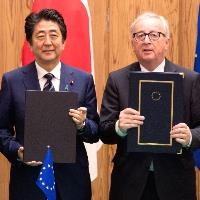(BRUSSELS) – The EU-Japan Economic Partnership Agreement entered into force on 1 February, allowing businesses and consumers across Europe and in Japan to take advantage of the largest open trade zone in the world.
In a statement, Commission president Jean-Claude Juncker said Europe and Japan were sending a message to the world about the future of open and fair trade: “We are opening a new marketplace home to 635 million people and almost a third of the world’s Gross Domestic Product, bringing the people of Europe and Japan closer together than ever before,” he said. “The new agreement will give consumers greater choice and cheaper prices; it will protect great European products in Japan and vice-versa, such as the Austrian Tiroler Speck or Kobe Beef; it will give small businesses on both sides the chance to branch out to a completely new market; it will save European companies 1 billion euro in duties every year and turbo-boost the trade we already do together.”
He added that the agreement showed that trade was about more than quotas and tariffs. “It is about values, principles and fairness. It makes sure that our principles in areas such as labour, safety, climate and consumer protection are the global gold-standard. This only happens when you work with the most natural of partners, separated by thousands of kilometres but united in friendship and values.”
Trade Commissioner Cecilia Malmstroem said European companies would from 1 February be able to benefit from removed tariffs and simplified customs procedures: “Our manufacturers, our service providers, our tech start-ups and our farmers all have something to celebrate. I am also proud that we have locked in our Paris climate deal commitments into a trade agreement for the first time, as well as setting high standards for workers’ rights and consumer protection. The stage is set for a significant boost in trade between us, which in turn creates jobs and lowers prices.
It was now up to businesses and individuals to make the most out of the new trade opportunities, she added.
The Economic Partnership Agreement removes the vast majority of the 1 billion of duties paid annually by EU companies exporting to Japan. Once the agreement is fully implemented, Japan will have scrapped customs duties on 97% of goods imported from the EU. The agreement also removes a number of long-standing non-tariff barriers, for example by endorsing international standards on cars. It will also break down barriers for key EU food and drink exporters to 127 million Japanese consumers and will increase export opportunities in a range of other sectors. Annual trade between the EU and Japan could increase by nearly 36 billion once the agreement is implemented in full.
The EU and Japan have agreed to set ambitious standards on sustainable development, and the text includes for the first time a specific commitment to the Paris climate agreement.
The key parts of the Economic Partnership Agreement
With regards to agricultural exports from the EU, the agreement will, in particular:
- scrap Japanese duties on many cheeses such as Gouda and Cheddar (which currently are at 29.8%) as well as on wine exports (currently at 15% on average);
- allow the EU to increase its beef exports to Japan substantially, while on pork there will be duty-free trade in processed meat and almost duty-free trade for fresh meat;
- ensure the protection in Japan of more than 200 high-quality European agricultural products, so called Geographical Indications (GIs), and the protection of a selection of Japanese GIs in the EU.
The agreement also secures the opening of services markets, in particular financial services, e-commerce, telecommunications and transport. It furthermore:
- facilitates to EU companies access to the procurement markets of 54 large Japanese cities, and removes obstacles to procurement in the economically important railway sector at national level;
- addresses specific sensitivities in the EU, for instance in the automotive sector, with transition periods of up to 7 years before customs duties are eliminated.
The agreement also includes a comprehensive chapter on trade and sustainable development; includes specific elements to simplify for small and medium-sized businesses; sets very high standards of labour, safety, environmental and consumer protection; strengthens EU and Japan’s commitments on sustainable development and climate change and fully safeguards public services.
Concerning data protection, the EU and Japan adopted decisions on 23 January of this year to allow personal data to flow freely and safely between the two partners. They agreed to recognise each other’s data protection systems as ‘equivalent’, which will create the world’s largest area of safe data flows.
As of 1 February, a large part of another agreement the Strategic Partnership Agreement between the European Union and Japan also applies on a provisional basis. This Agreement, which was signed in July of last year together with the Economic Partnership Agreement, is the first-ever bilateral framework agreement between the EU and Japan and strengthens the overall partnership by providing an overarching framework for enhanced political and sectoral cooperation and joint actions on issues of common interest, including on regional and global challenges. The Agreement will enter into force once it has been ratified by all EU Member States.
EU-Japan Economic Partnership Agreement - key elements
Dedicated website including:
Interactive map of EU businesses exporting to Japan and factsheets presenting the impact on each EU Member State (Austria, Belgium, Bulgaria, Croatia, Cyprus, Czech Republic, Denmark, Estonia, Finland, France, Germany, Greece, Hungary, Ireland, Italy, Latvia, Lithuania, Luxembourg, Malta, The Netherlands, Poland, Portugal, Romania, Slovakia, Slovenia, Spain, Sweden, United Kingdom)


